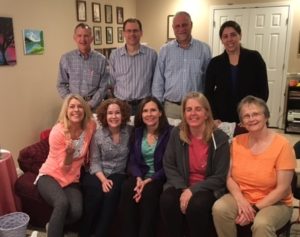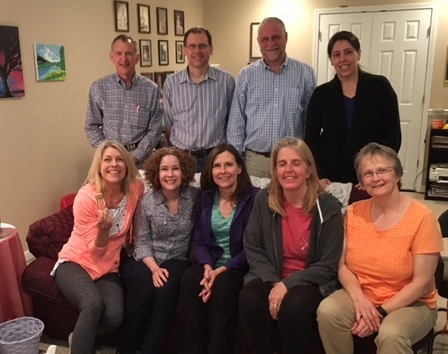I am helping Dr. Jim Wilder with his upcoming book on Facing Narcissism. We are learning that high-hesed identity groups are the way to help narcissists. Hesed is the Hebrew word for God’s sticky love. The book will contain FAQ, one of which I get to answer. This is my answer to “What do I do if I’m married to a narcissist?”
Narcissism comes packaged in different forms, ages, and intensities, ranging from grouchy, controlling, and verbally hurtful all the way to psychopathic and dangerous. If a situation is dangerous and the abuser is not willing to get outside help and show signs of change, separation may be necessary. For those married to, or who are themselves, a narcissist who is grouchy, controlling, and verbally harsh, there is hope.
Narcissists can get help in a high-hesed community.
How teachable, emotionally mature, and humble a narcissist is will greatly determine possibilities of change. Narcissists are wounded, immature, and difficult. Spouses are up against a difficult path when living with the pain that narcissism causes. The first order of help for either spouse is becoming part of a community that is high in hesed. We also call this kind of love, agape love.
How I am building high-hesed community.
Here are some ways that I have been building high-hesed community in my area. As multi-generational groups, we are working on our fear—fear of speaking to a narcissists’ behavior, fear that we will be attacked, and the fear that changes are impossible. Working on our fear starts with a close, intimate, trusting relationship with Immanuel. A relationship that constantly asks Him, “Where are You right now?” and “What do You want me to know?” Living the Immanuel lifestyle includes going to Jesus for healing of unresolved painful memories.
Relationships don’t work when the RCs are off in our brains.
We are learning that all relationships require the Relational Circuits in our brain to be “on” and functioning. We cannot relate to anyone as Jesus has taught us with our RCs “off.” (Any of us will act like a narcissist when our RCS are off.) Along with other relational brain skills our groups are learning how to fill in the holes in our emotional maturity. All of the above require us to learn what to do with emotional pain, to stop avoiding pain as we discover that we can make it through what we call “Pain Lab.”
Applying relational skills changes families.
In my hesed communities we are seeing huge transformations with parents (who have likely acted like a narcissist) and teens (who likely act like narcissists) as the parents incorporate relational brain skills into their every day interactions. When parents stop trying to control their teens, start seeing them as God sees them, practice thinking good thoughts about them (which shows up on the face), and become gentle responders to weakness, changes have happened within weeks. Through the resources we have, the modeling of relational skills, and the stories that we share, people are truly becoming more like Jesus.
Some resources:
For learning what to do with emotional pain and Pain Lab, we use my book, Re-Framing Your Hurts. For helping parents we have Handbook to Joy-Filled Parenting and Joy-Filled Parenting with Teens. There are two videos on YouTube for parents. For learning how the brain works, how to synchronize, build joy, and grow maturity we use my book, Joy-Filled Relationships. We can spend up to three months just going over Life Model’s maturity stages.
We look at weakness differently.
Every week in all groups we share appreciation moments and then do listening prayer with Immanuel. People go home and practice what we have gone over. Then they share their victories and failures next meeting. Many are on texting groups where we share ups and downs and prayer requests during the week. The flavor of our hesed communities is that it’s OK to have weaknesses. Our group identity is about being gentle protectors to weakness. Because we see narcissism as a weakness, not something to reject, we know what to do with it—we give gentle responses. We help narcissists see that how they are behaving is not like our hesed community.
Relational changes-a catalyst for narcissists.
If a narcissist is not willing to get into a group (or a family is not willing to be the group), changes will be more difficult. If the spouse grows hesed/agape and begins to relate differently, then this can be the catalyst that moves the narcissist to consider help. So, the person married to a narcissist needs first of all to concentrate on growing their hesed with Jesus and getting their own brain retrained. A narcissistic spouse (or child) might notice something different—and they might even ask if they can join the group.

.


Barbara
narcissist needs a lot of attention and drain my energy away.. so I removed narcissist out of my team.
But if they are in one of my small groups , how can we handle them ?
Miss seeing you and love you
Blessed to be A blessing
Eliza, This blog is the answer to your question when they are in the small group. We love with hesed love. We respond to their weakness (being a narcissist) with gentle responses and also protective of others in the group. It works best when the group identity is one of high hesed, and protective towards weakness. When we can say, We dont ________, we _________.
For example, We dont speak harshly, we speak kindly. Or–It’s not like our group to do _______________. Or it seems to me you are not acting like yourself (their Jesus self). What’s going on? How can I help?
Narcissists are best approached by a group that has this high hesed group identity. Speaking to them alone doesnt help much. We have to grow enough to not fear speaking to their behavior when Jesus leads. We have to watch out or we will become narcissists back at them. Think about that we all can act like a narcissist when our relational circuits are off.
And as you know, getting healing from past wounds. Narcissists are hurting. So look at the blog as the answer to your question briefly said.
How do we get the study guide to Pandora problem that is mentioned in the book?
Raelyn
Hi, Raelyn, The workbook/study guide will be out in early February. Deeper Walk will announce it and I will as well. It is being formatted and hopefully ready end of January. Dr. Wilder and I are waiting on them as they made the study guide a separate book. Thanks for your interest, Barbara